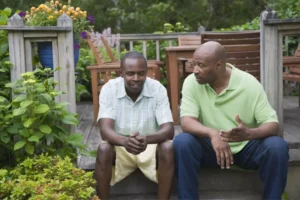When I moved to Cincinnati in June 2014, I not only said goodbye to my job, my friends and my city, but also my family. Though they only lived two hours away, I missed long dinners with my parents, quick stops to see my grandparents, and watching “Downton Abbey” with my mom on Sunday nights.
Loneliness crept in during those first months in Cincinnati. I longed for the camaraderie and comfort that comes from sharing daily life with those who know you well and love you anyway.
My Christian beliefs told me that I had a family in the church, and embracing my church as family was no longer an option; I realized that it was the way God would provide community for me in my new city.
Yet, forging relationships within my church was awkward, and I wasn’t sure how to go beyond the coffee date small talk. As Lindsey noted in her recent article, developing familial bonds with the church takes intentionality and effort. Here are four things I’ve done in the past two and a half years that have made my church family feel like family.
Attend a local church regularly.
Our world has trained us to think like consumers, considering what we want and what we can get out of a particular situation, product or event. That mindset can trickle over to how we think about church.
When we accept the gift of salvation, we gain new identities as children of God. We become members of the household of God, called to love and care for one another. We need to participate in the breadth and depth of church life and not simply pick and choose what we want to do.
Yet, we may be enthusiastic about the idea of embracing the church as family, then find ourselves disappointed when putting that idea into practice at a local church with sinful people like ourselves.
Dietrich Bonhoeffer offers this advice: “The person who loves their dream of community will destroy community, but the person who loves those around them will create community.”
We will hurt and be hurt within the church. We will be let down. We will experience awkward situations. The solution isn’t to withdraw and grow bitter, but to continue to love those God has put in our lives through the church.
Embrace the family dynamics.
The church is the place where we nurture and are nurtured in our faith. As John Calvin put it: “If God is our Father, the church is our mother.” At church, we mother and we’re mothered.
I have a dear friend from church who is several years ahead of me in life. We meet for coffee and lunch regularly, and she listens faithfully and counsels wisely as I share the challenges and joys of my life. Over time, our lives have interwoven beyond our coffee dates and lunches. Whether celebrating Christmas Eve together with our families or helping with a women’s Bible study, it’s been a blessing to have someone in my life who is supporting and encouraging me as I follow Jesus.
At church, I also have the opportunity to nurture others, especially children. Whether it’s volunteering in the nursery, hosting my children for cookie baking and tea parties or conversing with my friends’ children when I’m over at their homes, Scripture calls me to see children as a gift instead of an inconvenience or a bother. Betsy Childs Howard explains the opportunity for all believers to nurture children this way:
“Your spiritual children may or may not have the same last name as you, but I hope they will be so central to your life that you will say with apostle John, ‘I have no greater joy than to hear that my children are walking in the truth’ (3 John 4).”
Through embracing children as part of God’s family, I’ve the joy of seeing them mature into followers of Jesus and being part of their stories just as people in my church nurture me.
Show up.
Last August, my basement flooded with more than three feet of water and sewage. Almost everything was ruined, including some big ticket items like our furnace, washer and dryer, and chest freezer filled with food. We were without Internet and gas for a week. Insurance covered most of the expenses, yet we were left with the hassle and frustration.
Without fanfare or drama, our church showed up to help us.
Because our gas was shut off and I couldn’t cook, friends invited us for dinner and brought us meals all week. Other friends gave us a key to their apartment so we could do laundry. When pickers left garbage strewn across our yard after looking for valuable items, a friend helped us pick it up. Three different people had me to their homes so I could work since I was without Internet. I opened my mailbox one day to discover a grocery store gift card from another friend.
Kara Tippets writes,
“[Community] is the only way to know and be known. It’s where we see our own humanity and frailty, our gifts and our weaknesses. When we show up for one another, we invade each other in love and become witnesses to the truth that trials and sickness and pain are not the whole story.”
In the scheme of life, my basement flooding was a small problem. Yet through those humbling circumstances, God demonstrated how the church acts like a family, providing for our practical needs in our times of weakness.
Pray for them.
When I read the New Testament epistles, I’m struck by the continual references to prayer. Not only do the New Testament authors instruct us to pray, but they teach us how to pray through their letters. Consider these words from the opening of Paul’s second letter to the Thessalonians:
To this end we always pray for you, that our God may make you worthy of his calling and may fulfill every resolve for good and every work of faith by his power, so that the name of our Lord Jesus may be glorified in you, and you in him, according to the grace of our God and the Lord Jesus Christ.
Through praying like this for my church family, I find my heart being knit to them in ways I can’t explain. As I pray for the women and men in my small group and my Bible study, I desire their well-being and wholeness in the same way I want peace and joy for biological family.
Embracing these four practices over the past two and a half years has taught me one essential lesson: The church isn’t a consolation prize for the spouseless, childless, family-less. The church is my ultimate family, birthed out my fundamental identity as a child of God and made possible through the saving work of my Great Brother, Jesus. The church is a great and precious gift.
And there is joy and comfort to be had in the church if we choose to embrace the reality that it is our family.
Copyright 2017 Abigail Murrish. All rights reserved.











